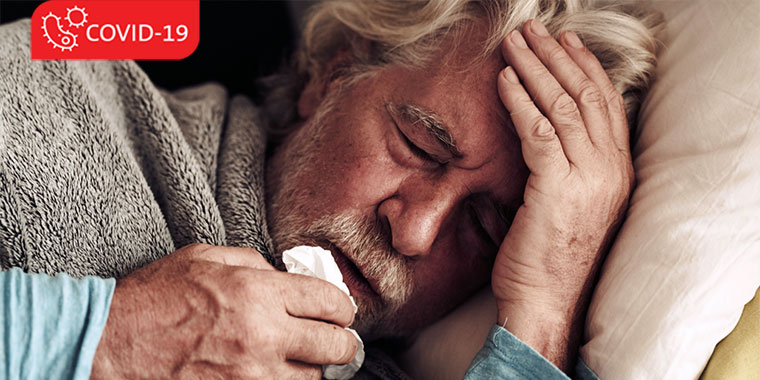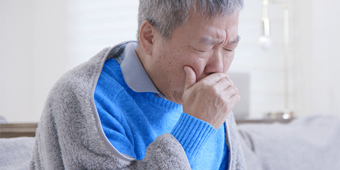Flu, Allergies, Common Cold, Or COVID-19: Know the Differences

Answer a few questions and we'll provide you with a list of primary care providers that best fit your needs.
It’s springtime in Southwest Ohio. Is your scratchy throat a sign of
seasonal allergies?
Flu?
Common cold? Or COVID-19?
Although there’s a lot we don’t know yet, understanding the differences between COVID-19 and other respiratory illnesses can be helpful.
Symptoms
While the symptoms of all four conditions can be similar, there are important differences.
COVID-19
Symptoms include fever, dry cough, body aches, fatigue, shortness of breath, possibly diarrhea and vomiting. In more severe cases, the virus can cause pneumonia, severe acute respiratory syndrome, kidney failure, and death. Symptoms show up
two to 14 days after you’ve been exposed.
“From what we’ve seen so far,” says Roberto Colón, MD, Premier Health Vice President of Quality and Safety, “about 80 percent
of those who get the virus have mild illness.” Of the rest, The World Health Organization estimates that 15 percent have severe infection requiring oxygen and 5 percent are critical, requiring ventilation.
“There is a population with a very high mortality: the elderly and those with chronic illnesses,” says Marc Belcastro, DO, Premier Health Chief Medical Officer.
Flu
Typical symptoms are fever, cough, body aches, fatigue, sore throat, headache, runny nose, possibly diarrhea, and vomiting. Symptoms usually show up two days after you’ve been infected.
Most recent estimates for the 2017-2018 U.S. flu season indicate that flu resulted in fewer severe cases than COVID-19. Of those who got the flu, 1.8 percent were hospitalized and an additional .14 percent died, according to the Centers for
Disease Control.
Common Cold
Symptoms include stuffy nose, sneezing, sore throat, possibly cough and body aches.
Seasonal Allergies
Typical symptoms are cough, sneezing, itchy eyes, runny nose, and scratchy throat. Symptoms are usually the same each year, and show up at the same time each year.
How It Spreads
COVID-19
COVID-19 spreads through droplets that become airborne when someone who is sick coughs or sneezes. You can become sick if you 1) inhale those droplets, or 2) touch a surface where these droplets have landed and then touch your mouth, nose or
eyes. Unlike the flu, children seem to get infected from adults. You could have the virus but not know it for up to 14 days. This means you could spread it to others without realizing it.
“If you’re sick with COVID-19, wearing a surgical-type mask will help prevent the droplets from being released into the air and spreading the virus to others,” says Dr. Colón.
“In addition, hand hygiene is one of the most important things you can do,” says Dr. Belcastro. “You can’t control everything you touch, but you can control what you do with your hands and keeping them clean.”
Properly washing and sanitizing your hands is crucial, adds Dr. Colón.
Flu
Spreads the same as COVID-19 does. Children frequently spread the flu to others.
Common Cold
Spreads the same as COVID-19 does.
Seasonal Allergies
Not contagious, but seasonal allergies may run in the family.
How It’s Treated
COVID-19
No vaccine or other medications are available yet, although they are in development. Treating COVID-19 is much like treating the cold or
flu, explains Dr. Belcastro. Because antibiotics kill bacteria and not viruses, they are not routinely used in the management of most viral
infections such as COVID-19, the common cold, or the flu.
Isolate yourself from others at home and don’t leave unless your doctor advises. Rest. If you’re having trouble breathing, call your doctor.
You can discontinue self-isolation if 1) you haven’t had fever in 72 hours, and 2) your other symptoms have improved, and 3) it has been at least seven days since your symptoms first appeared.
Flu
The flu vaccine can help prevent the flu. If needed, anti-viral medications are available with prescription. If your symptoms escalate or you are concerned, call your doctor.
Common Cold
Typical treatments are rest, fluids, and over-the-counter medications.
Seasonal Allergies
Stay indoors with windows shut when pollen counts are high. Over-the-counter medications may relieve your symptoms, as will prescription medications as advised by your doctor.
If You’re Experiencing COVID-19 Symptoms
If you’re experiencing symptoms of COVID-19, call your primary care provider. Please do not go directly to your doctor’s office or emergency department without calling first, since many can isolate at home without being evaluated in person. Alternatively, Premier Virtual Care is available 24 hours a day, seven days a week, offering video chat with a health care provider from the comfort of your home, minimizing the risk of exposure to yourself and others.
Answer a few questions and we'll provide you with a list of primary care providers that best fit your needs.
Source: World Health Organization; Centers for Disease Control and Prevention; Asthma and Allergy Foundation of America; American College of Allergy, Asthma & Immunology; Roberto Colón, MD; Marc Belcastro, DO; WDTN.com; Premier Health





